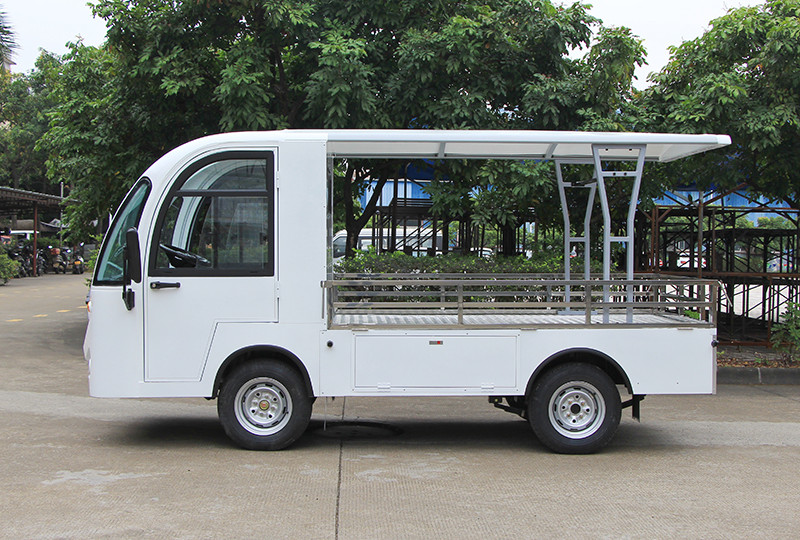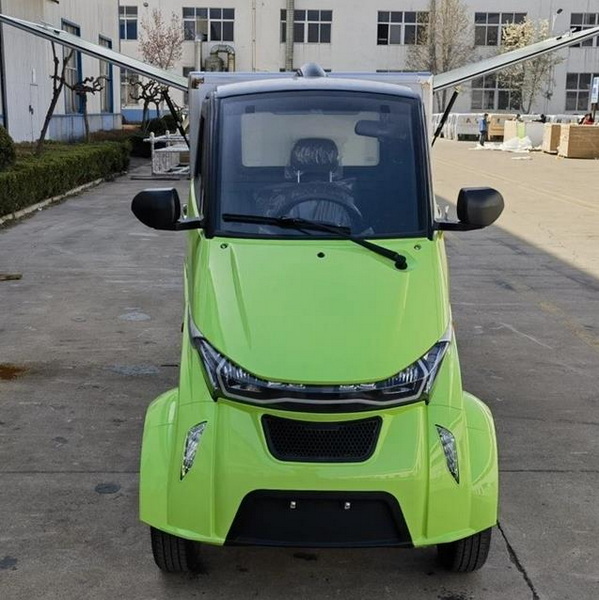Content Menu
● Introduction to Private Label Electric Mini Trucks
● Advantages of Private Label Electric Mini Trucks
● Challenges of Private Label Electric Mini Trucks
● Case Studies and Examples
● Leasing and Rental Options
● Integration with Existing Operations
● Technological Advancements
● Market Trends and Future Outlook
● Strategic Planning for Adoption
● Training and Support
● Conclusion
● FAQ
>> 1. What are the primary advantages of using Private Label Electric Mini Trucks in fleets?
>> 2. How do the costs of Private Label Electric Mini Trucks compare to diesel trucks?
>> 3. What are the common challenges faced by fleets adopting Private Label Electric Mini Trucks?
>> 4. Are there any leasing or rental options available for Private Label Electric Mini Trucks?
>> 5. How do Private Label Electric Mini Trucks support sustainability goals?
In recent years, the transportation industry has witnessed a significant shift towards electric vehicles (EVs), driven by environmental concerns and economic benefits. Among these, Private Label Electric Mini Trucks have emerged as a promising option for fleets looking to reduce costs and carbon footprints. This article explores whether a Private Label Electric Mini Truck is a cost-effective solution for your fleet, highlighting its advantages, challenges, and potential applications.

Introduction to Private Label Electric Mini Trucks
Private Label Electric Mini Trucks are compact, versatile vehicles designed for urban and short-range operations. They are often manufactured by companies that specialize in producing vehicles under private labels, allowing fleet managers to customize branding and specifications according to their needs. These trucks are equipped with advanced electric drivetrains, offering reduced operational costs and environmental benefits compared to traditional diesel-powered vehicles.
Advantages of Private Label Electric Mini Trucks
1. Environmental Benefits: Electric mini trucks produce zero emissions, contributing to cleaner air quality and reduced greenhouse gas emissions. This aligns with global sustainability goals and helps fleets comply with increasingly stringent environmental regulations.
2. Cost Savings: Electric vehicles generally have lower fuel costs since electricity is cheaper than diesel. Additionally, they require less maintenance due to fewer moving parts, leading to significant savings over time.
| Cost Component | Electric Mini Truck | Diesel Mini Truck |
| Fuel Cost | Lower | Higher |
| Maintenance | Lower | Higher |
3. Government Incentives: Many governments offer incentives such as tax credits and grants to encourage the adoption of electric vehicles. These can significantly offset the higher upfront costs of purchasing electric trucks and installing charging infrastructure.
4. Customization: Private labeling allows fleets to brand their vehicles, enhancing brand visibility and consistency across their operations.
5. Operational Efficiency: Electric mini trucks are quieter and produce less vibration, improving driver comfort and reducing noise pollution in urban areas.
Challenges of Private Label Electric Mini Trucks
1. Higher Upfront Costs: Despite long-term savings, electric mini trucks typically have higher purchase prices compared to their diesel counterparts. This can be a barrier for smaller fleets with limited capital.
| Cost Component | Electric Mini Truck | Diesel Mini Truck |
| Purchase Price | Higher | Lower |
2. Limited Range and Charging Time: Electric vehicles have limited driving ranges and require longer refueling times compared to diesel trucks. This can impact operational efficiency, especially for longer routes.
3. Infrastructure Requirements: Fleets need to invest in charging infrastructure, which can add to the initial costs.
4. Battery Durability: The lifespan of electric vehicle batteries is a concern, though advancements in technology are improving durability and reducing costs.

Case Studies and Examples
- KEYTON N50 Electric Mini Truck: This model offers a good balance of power and affordability, making it suitable for small businesses and urban operations. It features a CATL battery and has a driving range of up to 300 km.
- KAMA RuiTeng EV Pallet Truck: Known for its robust design and efficient battery technology, this truck is ideal for heavy-duty urban logistics. It boasts a range of 210 km and fast charging capabilities.
Leasing and Rental Options
For fleets hesitant about the upfront costs, leasing or renting Private Label Electric Mini Trucks can be a viable alternative. Companies like TIP Group offer flexible leasing solutions that allow fleets to transition to electric vehicles without significant capital outlay. Leasing also provides an opportunity to upgrade to newer models as technology advances, ensuring fleets stay competitive.
Integration with Existing Operations
To maximize the benefits of Private Label Electric Mini Trucks, fleets should consider integrating them into their existing operations strategically. This involves optimizing routes to minimize charging downtime, investing in smart charging systems to manage energy consumption efficiently, and training drivers on the best practices for electric vehicle operation.
Technological Advancements
The electric vehicle industry is rapidly evolving, with ongoing advancements in battery technology, charging infrastructure, and vehicle design. These developments are expected to address current challenges such as range anxiety and high upfront costs, making Private Label Electric Mini Trucks even more attractive in the future.
Market Trends and Future Outlook
As environmental regulations tighten and consumer demand for sustainable practices grows, the demand for electric vehicles is likely to increase. Fleets that adopt Private Label Electric Mini Trucks early can gain a competitive edge by showcasing their commitment to sustainability and reducing operational costs.
Strategic Planning for Adoption
When planning to adopt Private Label Electric Mini Trucks, fleets should conduct thorough analyses of their operational needs, including route optimization and charging infrastructure requirements. This strategic planning ensures a smooth transition and maximizes the benefits of electric vehicles.
Training and Support
Providing comprehensive training to drivers and maintenance staff is crucial for the successful integration of electric vehicles into a fleet. This includes education on electric vehicle operation, charging procedures, and troubleshooting techniques.
Conclusion
In conclusion, Private Label Electric Mini Trucks offer a compelling solution for fleets seeking to reduce operational costs and environmental impact. While they present challenges such as higher upfront costs and infrastructure requirements, the long-term benefits and government incentives make them an attractive option for urban and short-range operations.

FAQ
1. What are the primary advantages of using Private Label Electric Mini Trucks in fleets?
The primary advantages include reduced operational costs due to lower fuel and maintenance expenses, environmental benefits from zero emissions, and customization options for branding.
2. How do the costs of Private Label Electric Mini Trucks compare to diesel trucks?
Electric mini trucks have higher upfront costs but offer long-term savings through lower fuel and maintenance costs. Additionally, government incentives can offset initial expenses.
3. What are the common challenges faced by fleets adopting Private Label Electric Mini Trucks?
Common challenges include higher purchase prices, limited driving ranges, longer charging times, and the need for charging infrastructure.
4. Are there any leasing or rental options available for Private Label Electric Mini Trucks?
Yes, leasing or renting is a viable option for fleets that want to avoid high upfront costs. Companies like TIP Group provide flexible leasing solutions.
5. How do Private Label Electric Mini Trucks support sustainability goals?
These trucks support sustainability by producing zero emissions, reducing greenhouse gas emissions, and helping fleets comply with environmental regulations.










































